India’s bid to commit genocide in IOK won’t be tolerated: President Alvi
Dr Arif Alvi says any such attempt would put not only regional peace but peace of the whole world in danger
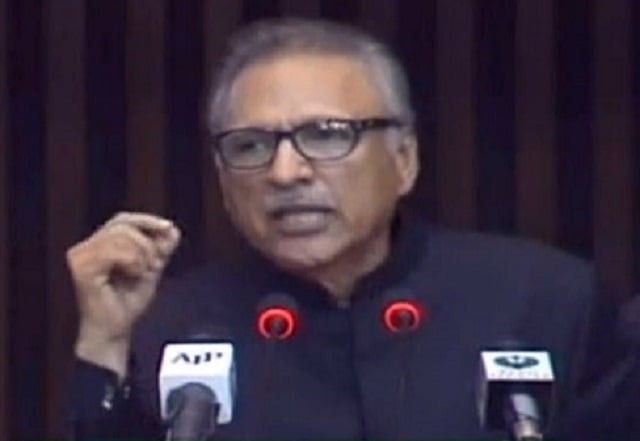
India’s bid to commit genocide in IOK won’t be tolerated: President Alvi
President Dr Arif Alvi has said the Indian government’s atrocities in Occupied Jammu and Kashmir could lead to a genocide, which would not only put the regional peace but peace of the whole world in danger.
He said this while addressing a joint sitting of parliament at the beginning of the second parliamentary year of National Assembly under the Pakistan Tehreek-e-Insaf (PTI) government in Islamabad on Thursday.
Chiefs of all three armed forces including Chairman Joint Chiefs of Staff Committee (CJCSC) General Zubair Mahmood Hayat as well as provincial governors, chief ministers, speakers of provincial assemblies and a number of foreign diplomats also attended the session.
After the special session, NA Speaker Asad Qaiser will also host a special dinner for the president.
“We’ll not leave Kashmiris alone at any juncture… we were, are and will always remain with our brothers in IOK,” said the president expressing solidarity with Kashmiris.
The address was marred by a protest from the opposition benches, who chanted anti-government slogans including “Go Niazi Go”.
They also gathered around the speaker’s dais and raised slogans against the government and the prime minister while holding placards.
The protest was staged against the economic crisis and ‘selected’ accountability. The opposition lawmakers censured the government for what they called its failure in foreign policy.
President Alvi said the government and the masses have reacted strongly to Indian Prime Minister Narendra Modi’s Kashmir move in violation of UNSC resolutions.
He said the government also reduced diplomatic ties with New Delhi and raised the issue at all international fora. “The issue was addressed at the UNSC meeting, which reflects that the Kashmir issue is not India’s internal matter but an international matter. Similarly, OIC strongly condemned the August 5 move and demanded that issue must be resolved in accordance with UNSC resolutions.”
President Alvi also thanked all countries that played their role in successfully holding UNSC meeting on Kashmir issue.
Lauding the reaction from the Organisation of Islamic Cooperation (OIC), the president particularly spoke high of the joint statement from the UN Human Rights Council, with the support of 58 countries, demanding from India to immediately remove all restraints in Occupied Jammu and Kashmir.
President Alvi also commended the recent visit of the prime minister to the US and said that Pakistan would welcome American initiative towards mediation for the just and sustainable resolution of this dispute.
He said due to presence of over 900,000 Indian troops, IOK is the most militarised zone in the world. Kashmiris are braving Indian brutalities including custodial murders, rapes and torture, said the president, adding that the curfew in the occupied valley has now entered in its sixth week with other inhuman restrictions in place including a blanket communication blackout.
“We have always answered India’s aggression with responsibility in a bid to ease down the already volatile situation. When India violated Pakistan’s airspace [in February this year], the Pakistan Air Force (PAF) responded with great valour and showed military forces’ operational preparedness to India.
He said Kulbhushan Jadhav’s presence in Pakistan is evidence that India has always sponsored terrorism on Pakistani soil. “He has confessed that he is a serving officer and was sent to ignite tensions in Balochistan,” he added.
The president said a Hindu extremist mindset had taken over India and the world would have to confront these fascist policies. He said the religious extremism of RSS was fast reshaping the face of Mahatma Gandhi and Jawaharlal Nehru’s India and had made the lives of minorities and moderates of India unsafe.
The joint session, which started at 520pm against the scheduled time of 5pm, lasted an hour and three minutes.
The proceedings started with the national anthem followed by the recitation of the Holy Quran and Na’at.
The sitting was chaired by National Assembly Speaker Asad Qaiser while Deputy Speaker Qasim Khan Suri was also present. Senate Chairman Sadiq Sanjrani and Deputy Chairman Senate Saleem Mandviwala also attended the session.
Prime Minister Imran Khan attended the entire sitting while Opposition Leader Shehbaz Sharif was present for 53 minutes, according to the Free and Fair Election Network (Fafen).
“360 lawmakers (81% of the total membership – 446) were present at the start of the sitting and 371 (83%) at the time of adjournment,” it said in a press release.
Human rights and state’s responsibilities
President Alvi, terming protection of fundamental rights as primary responsibility of a state, said the basic idea of Pakistan was to establish a system based on justice, tolerance and equality with every citizen enjoying liberty.
“We have to make Pakistan a welfare state where employment, health, education, equitable distribution of resources and justice are available,” he said.
The government’s dream to set up a governance model, inspired by the Islamic history's first welfare State of Madinah, could only be realised with collective efforts and contribution by every single individual of the nation, said the president.
He said protection of life, property and honour, provision of education and health services, and access to speedy justice, were the symbols of good governance. “Provision of easy and speedy justice is a step towards the State of Madinah,” he stressed.
The president lauded the socio-economic projects launched by the government including Ehsaas programme with a broader aspects of poverty alleviation and social safety network, aimed at benefiting the low-income groups of society.
On women emancipation, the president emphasised on giving them due place in society and ensuring their right to inheritance through requisite legislation and practical steps. He also lauded the Sehat Sahulat Programme under which Sehat Insaf Card had been launched, providing access to15 million people to free health services besides the Prime Minister's National Programme for Prevention and Control of Hepatitis C.
The president commended the government’s efforts for education particularly taking all stakeholders on board in the preparation of National Education Policy Framework and for making functional NAVTTC and other technical and professional training institutions.
Military capabilities and regional conflicts
President Dr Alvi said being the world’s seventh and Muslim world’s first atomic power, Pakistan's nuclear assets were a deterrent to the aggressive designs of its enemies. The president said the nation was proud of its valiant armed forces that proved their mettle to the world by fighting a long, arduous war against terrorism.
He termed as auspicious the establishment of National Internal Security Committee and National Intelligence Committee and said that in past, due to certain bad decisions, the country incurred the curse of extremism.
He said the country’s biggest political mistake was to get involved in others’ wars. He mentioned that giving refuge to millions of Afghans was an unprecedented example of hospitality and generosity in the world, yet it adversely impacted Pakistani economy. “In view of these matters, I would like to highlight that all major decisions should be taken by keeping national interests supreme,” he said.
The president said Pakistan was desirous of friendly relations with all its neighbours and all other countries indiscriminately on the basis of impartiality, equality, mutual trust and shared interests. He said a new era had begun under the government of Prime Minister Imran in the domain of foreign policy.
On Afghanistan, he said there was no military solution to the conflict and Pakistan wanted peace in Afghanistan through political dialogue.
He termed Pakistan-China relations an expression of ideal friendship and mutual trust, which had translated into China-Pakistan Economic Corridor (CPEC) with potential of bright future for entire region. He said bilateral relations between Pakistan and US, which during the last few years witnessed a downturn due to trust deficit, underwent a positive trend after the visit of PM Imran to Washington.
President Alvi said Pakistan’s relations with Saudi Arabia were of paramount importance and mentioned that the country always fully supported Pakistan through thick and thin. On Iran, he said the ties were also witnessing an upward trajectory and expressed gratitude to Turkey for always standing with Pakistan in difficult times.
He mentioned that Pakistan attached great importance to its relations with Russian Federation in fields of economy, defence and culture. Dr Alvi said Pakistan wanted closer economic, trade and investment relations with Europe and the European Union and termed recent agreement on Strategic Engagement Plan as a welcome development.
Pakistan is playing a vibrant and proactive role at United Nations and other international and regional organisations like Economic Coordination Organisation and Shanghai Cooperation Organisation, said the president, adding that Pakistan’s brave soldiers would also continue to play their positive role in UN peacekeeping missions.
With additional input from APP

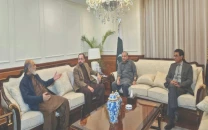
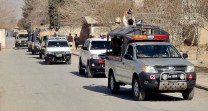

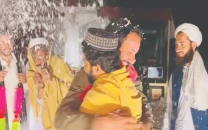

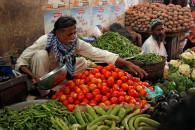












COMMENTS
Comments are moderated and generally will be posted if they are on-topic and not abusive.
For more information, please see our Comments FAQ